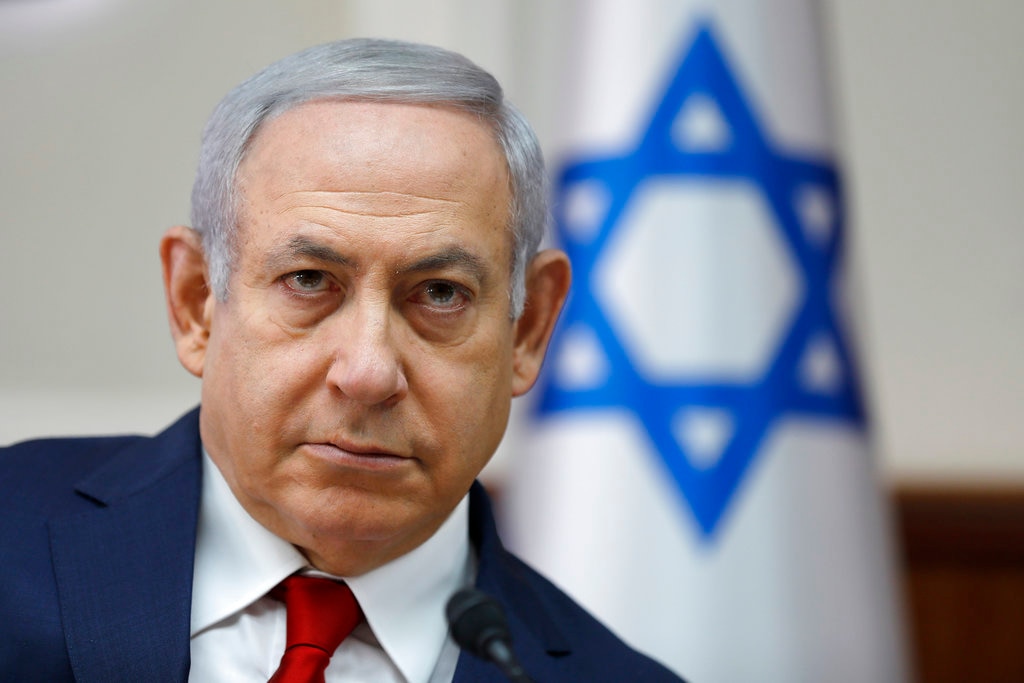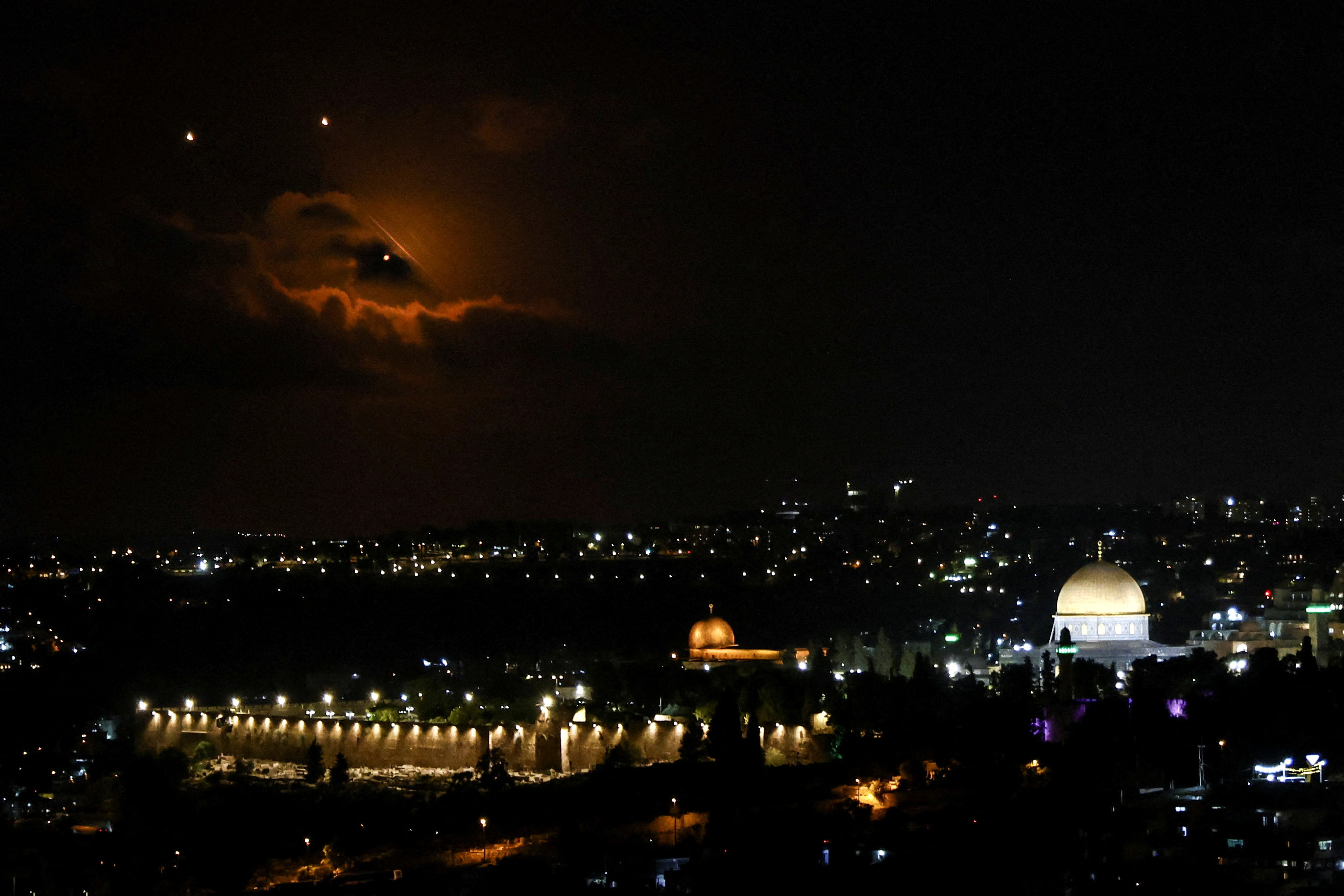Israel has promised Iran 'consequences'. Here are three things that could happen next
analysis

Benjamin Netanyahu has made it clear his country will respond to Iran's attack.
Straight after Iran fired its barrage of drones, rockets and ballistic missiles at Israel on Tuesday night, something was made clear.
"There will be consequences," said Rear Admiral Daniel Hagari, a prominent Israel Defense Forces (IDF) spokesman.
Although the country has been fighting adversaries on multiple fronts for about 12 months, the past fortnight has seen a series of escalations.
But if the rear admiral's words are to be true, another one could be imminent.
Iran said its assault was in response to Israel's assassination of Hezbollah leader Hassan Nasrallah in Beirut last week.
Here are three things Israel could do next.

Iran's attack lit up the sky over Jerusalem on Tuesday night, although the rockets aimed at the city were intercepted.
We've been here before
In April, we were at a similar crossroads in the region, and what Israel decided to do then could provide clues as to its potential retaliation this time.
Iran fired hundreds of drones, rockets and missiles directly at Israel in response to that country's air strike on its embassy compound in Damascus, Syria.
According to Israel, 99 per cent of the barrage was shot down by various sources, and the United States subsequently urged its close ally to "take the win" and not respond.
But six days after that attack, Israel launched several missiles at air-defence assets at a military site near Isfahan.
The site contains Iran's largest nuclear research facility.
While Iran went with a theatrical option, Israel made its point in a more targeted way: proving it had the capabilities to strike a sensitive target if it wanted to.
Israel's response was smaller in scale than Iran's attack, but it was clearly designed to walk a tightrope between deterring its enemy and avoiding escalating the situation further.
Crucially, Iran did not hit back last time, which could mean Israel opts for a similar option now: targeting military infrastructure, unlikely to cause civilian casualties, in a way that avoids any threat of sending the region deeper into conflict.
However, having been in this position earlier this year, Israel's military and political leaders may believe a stronger deterrent is needed for the Islamic Republic.
Escalation could be coming
What could a larger retaliation look like?
While we are still learning about the specifics of Iran's barrage, Pentagon spokesperson Major General Pat Ryder said it contained a lot more ballistic missiles than the one it sent in April, and that's significant because they're harder to shoot down.
Given that, a next step for Israel could be to target an Iranian nuclear facility, rather than an object near one like it did last time. Naftali Bennett, a former Israeli prime minister, has urged the IDF to do this.
Iran would, however, consider this a significant escalation.
Iran said it targeted military assets in Israel with its missiles this week. If Israel were to increase its response, while minimising the danger to civilians, it could attempt to strike its enemy's critical infrastructure, like power plants or oil production facilities.
Iran produces about 4 per cent of the world's oil, and some US politicians have called on Israel to target the industry.
Republican senator Lindsey Graham, from South Carolina, said the Biden administration should help Israel prepare an "overwhelming response" and that Iran's oil refineries should be "hit and hit hard".
What about restraint?
This is a long shot, but there is always the possibility that Israel could do nothing.
Despite directly attacking Israel twice this year, Iran has made it clear it does not want a war. Analysts say that while the barrages of rockets, drones and ballistic missiles could be interpreted as an aggression, they're supposed to be a deterrent.
There are a few things that mean Israel doing nothing is unlikely.
The first is that multiple political and military leaders within the state have pledged to retaliate.
But there's also been an obvious calculous shift in what it is prepared to do.
While Israel has for a long time fought Iran via its proxies in Hezbollah (in Lebanon), Hamas (in Gaza), the Houthis (in Yemen) and the Syrian regime, 2024 has brought a major development: Iran and Israel have attacked each other directly.
With that frontier crossed, restraint appears much less likely.
After Iran's April attack, Israel's allies urged it not to escalate the situation. However, those calls have been much quieter this time. It's another factor that makes it highly unlikely Israel will not respond.
Further, there's the fact that Israel will also know it can defeat Iran militarily.
Decades of Western sanctions have taken their toll on Iran. The country's air defence systems are not hermetic. Iran's air force is outdated.
For all of these reasons, it's not now a question of if Israel hits back, but rather when, and how hard.
By:https://www.abc.net.au/news/2024-10-03/three-things-israel-could-do-next-after-iran-attack/104425736(责任编辑:admin)
下一篇:Inside the Republican strategy that could cost Kamala Harris this crucial swing state
 Socceroos rescue a point
Socceroos rescue a point  Wallabies thrash Wales 52
Wallabies thrash Wales 52 Jake Paul beats Mike Tyso
Jake Paul beats Mike Tyso Live updates: England vs
Live updates: England vs  US election 2024: Donald
US election 2024: Donald  US election live: Kamala
US election live: Kamala
- ·North Korea's latest weapon agains
- ·Hezbollah says Israel 'cannot impo
- ·Inside the rise of US oligarchs and how
- ·Thailand's worst suspected serial
- ·Tabi shoes are turning heads from Holly
- ·FBI arrests Florida man planning attack
- ·Illegal immigrant gets life sentence fo
- ·Bibles, water, watches and sneakers: Do
- ·North Korea's latest weapon against
- ·Hezbollah says Israel 'cannot impose
- ·Inside the rise of US oligarchs and how i
- ·Thailand's worst suspected serial ki
- ·Tabi shoes are turning heads from Hollywo
- ·FBI arrests Florida man planning attack o
- ·Illegal immigrant gets life sentence for
- ·Bibles, water, watches and sneakers: Dona
- ·US to give Kyiv anti-personnel landmines
- ·An arrest warrant for Benjamin Netanyahu
- ·One of Vietnam's high-profile politi
- ·Shanghai Walmart Attack: A Man Randomly S
- ·South Korean police officers jailed over
- ·Cambodia publicly shames maid deported af
- ·North Korea to use all forces including n
- ·Philippines condemns China attack of Viet
- ·US adds 2 more Chinese companies to Uyghu
- ·North Korean defector steals South Korean
- ·Malaysia deports Cambodian worker for cal
- ·Rebels battle for Myanmar junta’s weste

